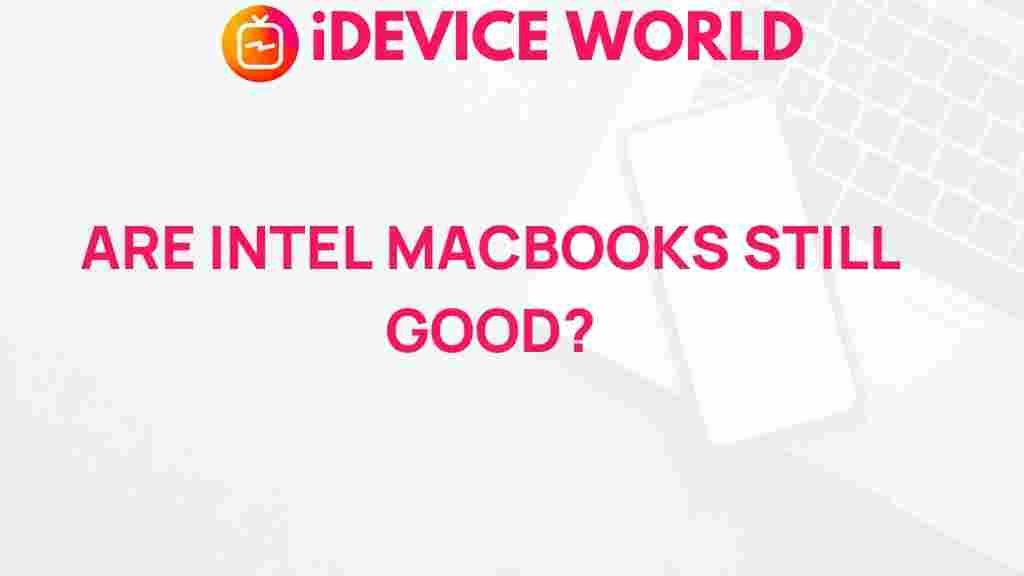Unveiling the Truth: Are Intel MacBooks Still Worth It?
The debate surrounding Intel MacBooks has become increasingly prominent as Apple transitions to its own silicon. Many users are left wondering: are Intel MacBooks still worth the investment? In this article, we will delve into the performance, longevity, and overall value of Intel MacBooks, helping you make an informed decision.
Understanding Intel MacBooks
Intel MacBooks are laptops manufactured by Apple that utilize Intel processors. These models were widely popular before Apple announced its shift to Apple Silicon, which has led to questions about the relevance of Intel-powered machines in today’s tech landscape.
The Advantages of Intel MacBooks
Despite the transition to Apple Silicon, Intel MacBooks still hold certain advantages that may appeal to specific users:
- Compatibility: Many legacy applications and software still run best on Intel architectures, making these MacBooks ideal for users reliant on such programs.
- Performance: Intel MacBooks, especially the higher-end models, continue to deliver excellent performance for tasks such as video editing, gaming, and graphic design.
- Variety: A broader range of models and configurations are available, allowing users to choose options that best fit their needs.
Performance Comparison: Intel vs. Apple Silicon
One of the primary concerns for potential buyers is how Intel MacBooks stack up against the newer Apple Silicon models.
Here’s a breakdown of key performance aspects:
- Processing Power: Apple’s M1 and M2 chips outperform many Intel processors in benchmarks, particularly in multicore tasks.
- Battery Life: Apple Silicon devices offer significantly improved battery life, often lasting up to 20 hours compared to Intel models.
- Thermal Management: Intel MacBooks can run hotter and louder under load, while Apple Silicon models maintain cooler operating temperatures.
Step-by-Step Guide to Choosing an Intel MacBook
To help you decide if an Intel MacBook is right for you, consider the following steps:
Step 1: Assess Your Needs
Determine what you primarily use your laptop for:
- Basic Tasks: If you primarily browse the web or use productivity software, an Intel MacBook may suffice.
- Heavy Applications: For video editing, 3D modeling, or gaming, consider higher-spec models.
Step 2: Research Available Models
Familiarize yourself with the different Intel MacBook models:
- MacBook Air (Intel): Lightweight and portable, suitable for everyday tasks.
- MacBook Pro (Intel): More powerful, with enhanced features for professional use.
Step 3: Compare Prices
Intel MacBooks can often be found at discounted prices, especially as retailers make room for newer models. Compare prices across various platforms:
Step 4: Consider Future-proofing
Think about how long you plan to use the device. Apple Silicon models are expected to receive updates and support for a longer duration, while Intel models may become obsolete sooner.
Troubleshooting Common Issues with Intel MacBooks
Even the most reliable laptops can encounter problems. Here are some common issues users face with Intel MacBooks, along with troubleshooting tips:
Issue 1: Slow Performance
If your Intel MacBook is running slowly, try the following:
- Close unused applications and browser tabs.
- Clear system cache and temporary files.
- Upgrade your RAM if possible.
Issue 2: Overheating
Overheating can be a sign of hardware issues or insufficient ventilation. Consider these steps:
- Ensure that vents are not blocked.
- Use a cooling pad during intensive tasks.
- Check for software updates that may address performance issues.
Issue 3: Battery Problems
If your battery drains quickly, follow these tips:
- Check battery health in the system settings.
- Reduce screen brightness and disable unused features.
- Consider replacing the battery if it’s aging.
Conclusion: Are Intel MacBooks Still Worth It?
In conclusion, while Apple’s transition to its own silicon has raised questions about the future of Intel MacBooks, they still offer value for certain users. Whether you need compatibility with legacy software, a wide range of options, or are looking for a cost-effective device, Intel MacBooks can still be a smart choice.
Ultimately, the decision should be based on your specific needs, budget, and how long you plan to use the laptop. As technology continues to evolve, staying informed will help you make the best choice for your computing needs.
For more information on the latest tech trends, check out this comprehensive guide.
This article is in the category Reviews and created by iDeciveWorld Team
